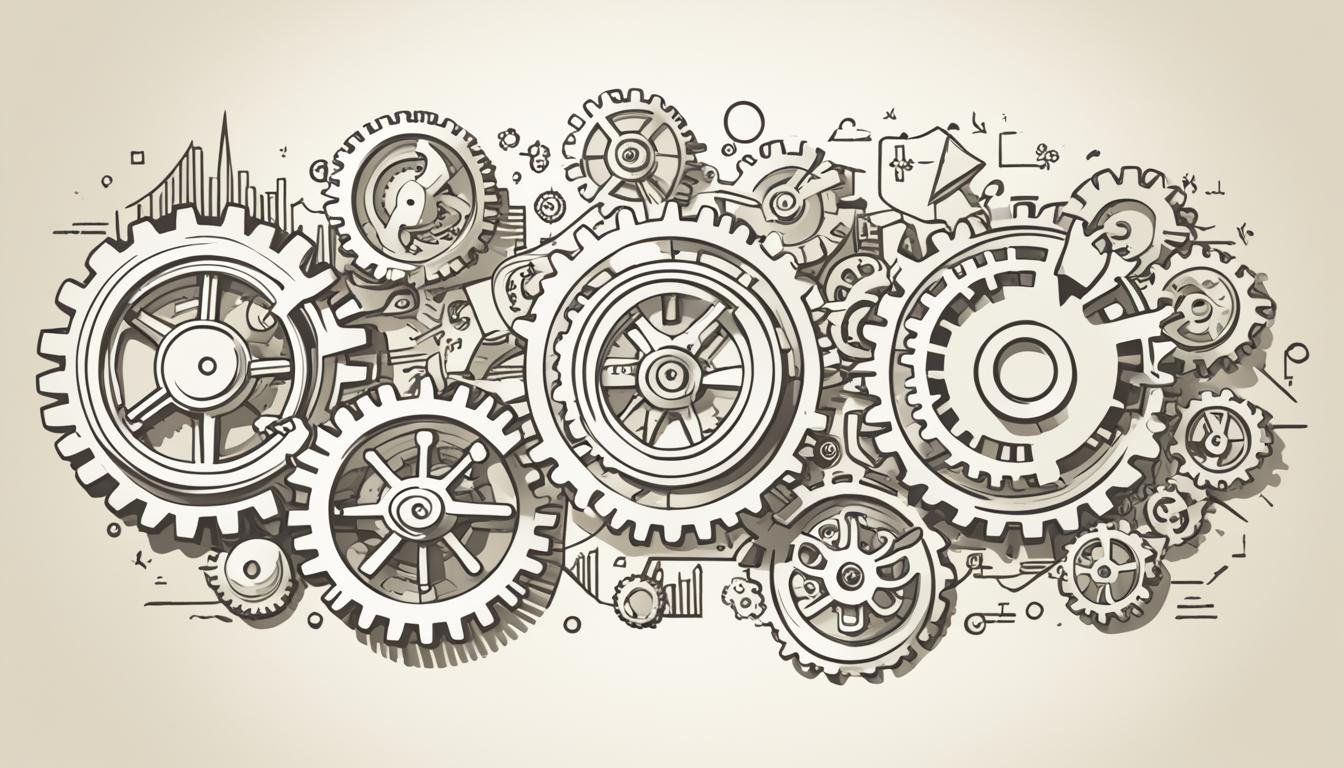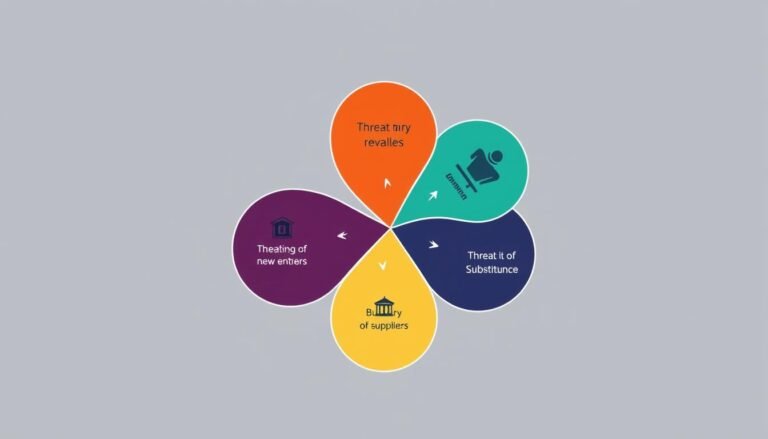Business Theory Evolution and Future Trends
The business world is always changing, making evolution key. Just like Charles Darwin’s theory changed how we see nature, business evolution changes how companies deal with competition and new ideas. From trading to today’s big companies, business has always been about changing and staying ahead.
What are the main ideas and strategies that have shaped modern business? How can companies use evolution to stay ahead and succeed? Join us as we explore the evolution of business theory and see what the future holds for how we do business in the digital age.
The Origins of Digital Transformation
The digital revolution has changed the business world. It has brought in a new era of innovation and efficiency. At the center of this change are digitization and digitalization. These ideas have greatly affected companies in many industries.
From Digitization to Digitalization
The start of digital transformation was digitization. It turned analog data into digital formats. This made it easier to store, change, and send data, setting the stage for more digital growth.
Then, digitalization came along. It was about fully changing a company’s activities, processes, products, and services into digital ones. This used technology to make workflows smoother, more efficient, and better for customers.
The Emergence of the Digital Economy
The digital transformation era brought digital tech into the heart of business. This led to the digital economy. Companies could now make their processes better, connect more, and use the growth of e-commerce. This changed how they work with customers and add value.
The start of digital transformation goes back to Industry 4.0, which began in Germany. It focused on making the manufacturing sector more innovative. This was a big step in the digital world, leading to a full approach to changing businesses.
“The digital transformation era represents a profound shift in how organizations operate and innovate in the digital age, going beyond mere digitalization to a holistic reimagining of business models, processes, and customer interactions.”
Key Drivers of Organizational Digital Transformation
Organizational digital transformation is a journey that needs a mix of leadership, culture, and technology. Leaders must create a culture that values innovation, creativity, and learning. This approach helps move forward in the digital world.
Leadership and Organizational Culture
Leaders are key in making the culture ready for digital changes. They should be inclusive, work well with others, and adapt quickly. This creates a space where trying new things and taking risks is encouraged. By doing this, companies can find new ways to grow and stay ahead.
Technological Enablers
The internet and digital tools have made it easier for companies to change digitally. Things like automation, machine learning, and cloud computing help improve how things work inside a company. They also make customer experiences better and let companies try out new ways of doing business online.
As companies change digitally, leaders need to use these drivers well. This helps unlock the power of digital tech and build a culture that does well in the digital world.
“Technology contributes to progress but also poses ethical and change management issues. Adaptive societal responsiveness is crucial in the face of increased connectivity, data analytics, and artificial intelligence.”
- Organizational digital transformation is driven by leadership, organizational culture, and technological enablers.
- Effective leaders must foster a culture of innovation, creativity, and continuous learning to drive progress.
- Advancements in automation, machine learning, and cloud computing enable organizations to optimize processes and explore new business models.
Navigating the Ethical Landscape
Organizations going through digital change face a tough ethical landscape. The more we connect, use data analytics, and rely on AI, the more ethical issues pop up. These issues include how we handle personal data and keep it safe.
Data Privacy and Security Concerns
The digital economy makes protecting sensitive data a top priority. Companies must put data privacy and security first. They need to keep customer info safe and use data responsibly. If they don’t, they could lose trust and suffer from bad reputations.
The Morality of Artificial Intelligence
AI’s growing use brings up tough ethical questions. It’s meant to make things more efficient, but how it makes decisions matters. Companies must think about how AI works to make sure it’s right and good for society. They need to balance human and machine interactions carefully.
By tackling these ethical issues, companies can use digital change for good. They keep their stakeholders’ trust and show they’re responsible leaders in the digital world.
“Ethical issues will have a ‘severe’ impact on companies in their industry in the next three years, according to 65% of leaders in the study.”
Business Theory Evolution and Future Trends
The business world is always changing. It’s key for companies to keep up by knowing about new business theories. These theories help predict what the future holds for business. They cover everything from old economic ideas to new ones like behavioral economics.
Now, there’s a big focus on how businesses can change and grow. This means looking at how people work together and innovate. It’s all about being adaptable and working together to succeed.
A recent symposium at NYU’s Stern School of Business talked about how evolution affects business. They discussed how genes and culture change together, how cultures evolve, and how evolution helps in economics. These ideas are opening up new ways to manage and innovate in business.
Looking ahead, how we manage companies is changing. We’re moving from old models to new ones that focus on knowledge and being adaptable. Knowing about the history of management theories helps leaders make smart choices. It helps them see what challenges are coming and how to get ready for them.
By keeping up with changes in business theories, companies can stay ahead. Using ideas from evolutionary economics and Darwin’s work helps them grow and last over time.
Source Links
- A Brief History of Business and Business Theory
- The Theory of Evolution and the Business Climate
- History of Business & Evolution of Business | Immerse Education
- Organizational digital transformation: from evolution to future trends
- 10 Future Trends in the Digital Transformation Industry
- Where do we go from here? Navigating the future of digital transformation
- DTS-08-2023-0061_proof 240..256
- Navigating Digital Transformation and Knowledge Structures: Insights for Small and Medium-Sized Enterprises – Journal of the Knowledge Economy
- What is digital transformation? Guidance from change experts
- Navigating the Changing Tides of Business Methodologies
- Technology, Megatrends and Work: Thoughts on the Future of Business Ethics – Journal of Business Ethics
- The Grand Theory Of Business, From Charles Darwin
- Evolutionary Economic Theory – TheoryHub – Academic theories reviews for research and T&L
- The Evolution of Management Models: A Neo-Schumpeterian Theory






